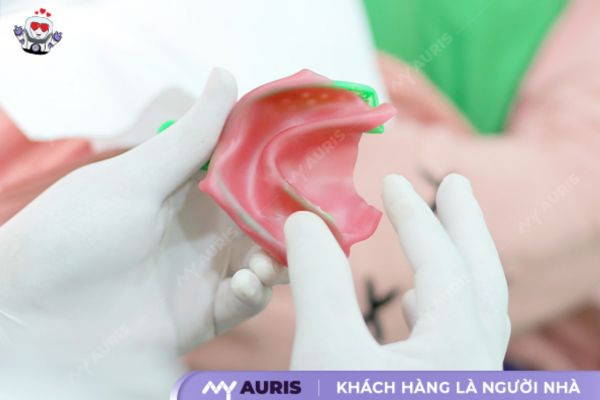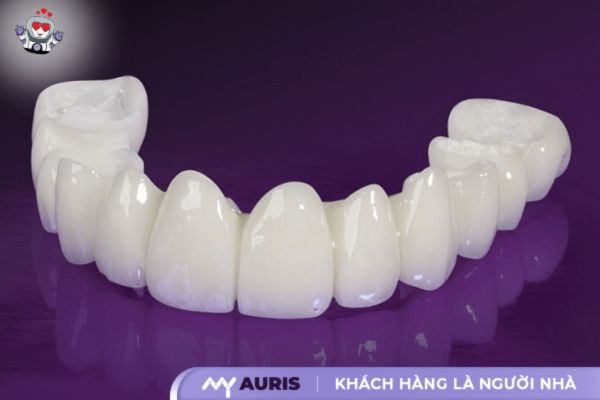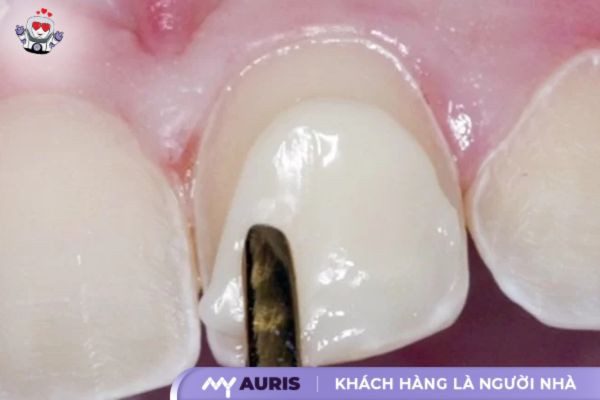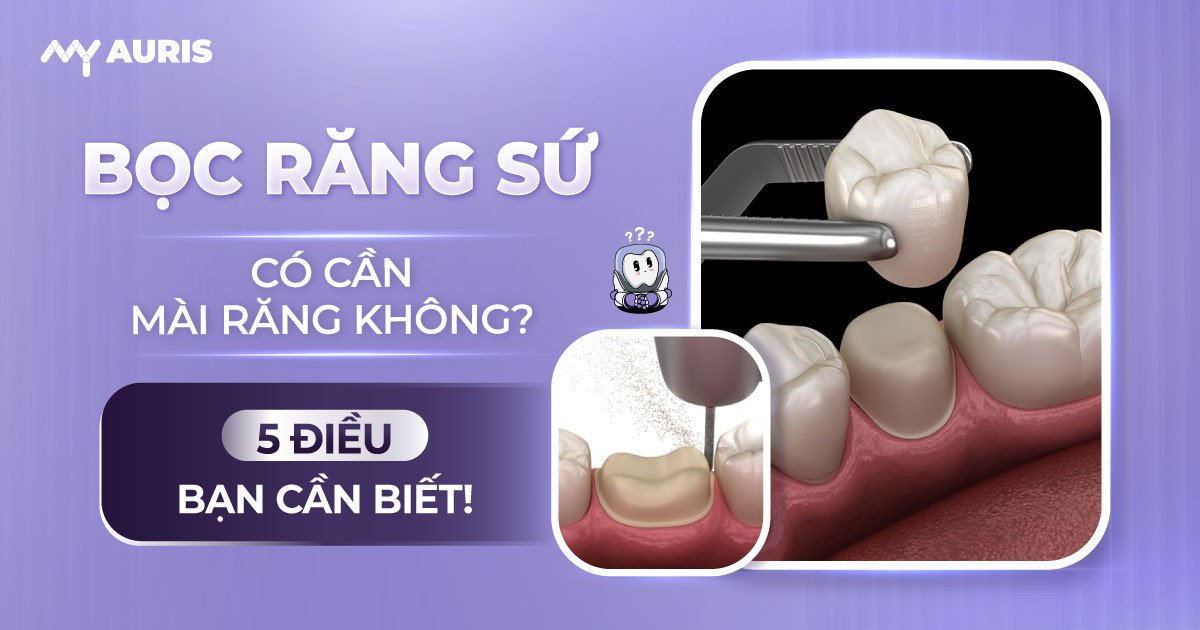Do you want to have bright, white, beautiful teeth with porcelain crowns? However, are you worried about teeth grinding? Do porcelain crowns require tooth grinding? Does grinding your teeth a lot have any effects? My Auris will help you better understand tooth grinding when using porcelain crowns, cases where tooth grinding is needed, how to minimize harm and choose safe and effective tooth restoration methods.
Learn about the porcelain crown process
The porcelain crown process is a complex process, including many steps, from consultation to porcelain crown placement.
Examination and consultation
The first step is examination and consultation. The dentist will examine your oral condition, assess the level of tooth damage, and choose the type of porcelain teeth that suits your needs and oral health status. The doctor will also advise on the porcelain crown process, cost, implementation time, and notes you need to know.
Teeth preparation
After examination and consultation, the dentist will prepare the teeth. This step includes:
- Oral hygiene: The dentist will clean your teeth with specialized tools to remove plaque and tartar, creating favorable conditions for performing the next steps.
- Tooth preparation: The dentist will remove the damaged tooth and grind the tooth (if necessary) to create a suitable shape for the porcelain tooth. Teeth grinding is necessary to create a contact surface for porcelain teeth, helping porcelain teeth adhere firmly to real teeth.
- Taking tooth impressions: After preparing the teeth, the dentist will take tooth impressions to create molds for porcelain teeth. The dentist will use specialized impression materials such as silicon and alginate to create accurate tooth molds.

Taking tooth impressions
After preparing the teeth, the dentist will take tooth impressions to create a mold for the porcelain teeth. The dentist will use specialized impression materials such as silicone, alginate to create accurate tooth molds.
Ceramic tooth fabrication
After taking tooth impressions, the dentist will send tooth molds Go to the lab to make porcelain teeth. At the lab, technicians will use specialized dental materials to create porcelain teeth according to the mold of the teeth taken. The type of material used to make porcelain teeth can be zirconia ceramic, E-max porcelain, metal ceramic or composite ceramic.
Ceramic tooth attachment
When the porcelain teeth are finished being manufactured, the dentist will attach the porcelain teeth. This step includes:
- Dental hygiene: The dentist will clean your teeth again to ensure that real teeth are clean, creating favorable conditions for porcelain teeth to be attached.
- Attaching porcelain teeth: The dentist will use specialized glue to attach porcelain teeth to real teeth. After attaching the porcelain teeth, the dentist will check the fit and make adjustments if necessary.
- Check: After attaching the porcelain teeth, the dentist will check the fit and make adjustments if necessary. You will also be instructed on how to care for porcelain teeth to keep them beautiful and durable for a long time.

Do porcelain crowns require tooth grinding?
To cover porcelain teeth, the dentist needs to grind a thin layer of tooth enamel to shape the porcelain crown, ensuring the porcelain crown fits tightly and hugs the real tooth. Grinding teeth to get porcelain crowns can cause certain harm to real teeth. Understanding the types of porcelain teeth and the level of tooth grinding will help you choose the appropriate method to protect your oral health.
Zirconium porcelain teeth
Zirconia porcelain teeth are the most popular type of porcelain teeth today because of their high durability, good chewing ability and beautiful natural color.
| Features | Description |
|---|---|
| Advantages | |
| Durability | Durable strong, durable, less susceptible to wear, no yellowing. |
| Color | Bright, natural white color, similar to real teeth. |
| Biocompatibility | High biocompatibility, does not irritate the gums. |
| Disadvantages point | |
| Cost | Higher cost than other types of teethOther differences. |
| Transparency | Transparency is worse than E-max porcelain teeth. |
| Level of tooth grinding | Zirconium ceramic teeth usually require more grinding than E-max porcelain teeth, but still less than metal ceramic teeth. |

E-max porcelain teeth
E-max porcelain teeth are made from lithium disilicate, a high-quality porcelain with high transparency, giving a beautiful natural color, similar to teeth. real.
| Features | E-max Porcelain Teeth | Zirconium Porcelain Teeth |
|---|---|---|
| Advantages | ||
| Color | Natural beauty, high transparency | Natural, but the transparency is less than E-max |
| Durability | High, good strength (but worse than Zirconia) | Very high, very good strength |
| Biocompatibility | High | High |
| Disadvantages score | ||
| Cost | Higher than Zirconia | Lower E-max |
| Strength resistance | Less than Zirconia | |
| Degree of tooth grinding | Less Zirconia | More than E-max |

Metal ceramic teeth type
Metal ceramic teeth are a type of porcelain teeth that were commonly used in the past because of their low price. However, this type of tooth has some disadvantages such as unnatural color, easy to stain and can cause gum irritation.
| Features | Advantages | Disadvantages |
|---|---|---|
| Cost | Lower than porcelain teeth Other | |
| Durability | High | |
| Color | Unnatural, prone to yellowing | |
| Gum irritation | May cause irritation Reaction | |
| Aesthetics | Poor compared to other types of porcelain teeth | |
| Level of tooth grinding | Requires a lot of tooth grinding, can cause damageabout oral health |
Composite ceramic teeth
Composite ceramic teeth are tooth-colored filling materials real teeth, often used to restore decayed or small chipped teeth.
| Features | Description |
|---|---|
| Advantages | |
| Price | Low |
| Color | Automatic However, the color can be mixed to match the color of real teeth |
| Implementation time | Fast |
| Disadvantages | |
| Durability | Not as high as porcelain teeth |
| Resistant to yellowing and grinding abrasion | Poor |
| Suitable | Not suitable for cases of large chipped or broken teeth |
| Degree of tooth grinding | Usually no need to grind teeth much, just create a rough surface for the composite material to adhere firmly to the tooth |

Cost of making porcelain crowns
The cost of making porcelain crowns often makes many people wonder, to better understand the cost of porcelain crowns, factors that affect the price and compare costs with other tooth restoration methods.
Factors affecting the price
The cost of making porcelain crowns depends on many factors, including:
- Type of porcelain teeth: Currently, there are many different types of porcelain teeth, from regular porcelain teeth to high-end porcelain teeth, each with different prices. High-quality porcelain teeth such as zirconia and Emax have high durability and good aesthetics, but the price is higher than regular porcelain teeth.
- Number of teeth: The more teeth that need porcelain crowns, the higher the cost will be.
- Prosthodontics: Complex restoration techniques will cost more. For example, tooth grinding techniques for veneers will be more complicated than tooth grinding techniques for regular ceramic crowns.
- Dental: Each dental clinic has different prices, depending on reputation, equipment and team of doctors. Reputable dentistry, using high quality materials and advanced techniques, often has higher costs.
Compare prices with other methods
The cost of making porcelain crowns is often higher than other tooth restoration methods such as fillings However, porcelain crowns are more durable, have better aesthetics and last longer.
- Tooth filling: Is a method of restoring teeth with small cavities and chips, with a lower price than porcelain crowns. Dental fillings are less durable and not as aesthetically pleasing as porcelain crowns.
- Braces: Is a method of moving real teeth to the desired position, creating beautiful, even teeth. The cost of braces can be higher or lower than porcelain crowns, depending on the type of braces and treatment time treatment.
Frequently asked questions about porcelain crowns
Here are some frequently asked questions about porcelain crowns, to help you make decisions. Make the right decision for your tooth restoration plan.
Do porcelain crowns hurt?
Doorth crowns hurt? Porcelain is usually performed under anesthesia, so you will not feel pain during the tooth grinding process. However, after the anesthetic wears off, you may feel pain, sensitivity to heat and cold, and pain when chewing.
To minimize the pain, you can:
Do porcelain crowns require tooth grinding? No?
If you want to get a porcelain crown, you will need to grind a thin layer of enamel to ensure the porcelain crown fits tightly to the real tooth. However, the dentist will only grind a thin layer of enamel, without affecting the real tooth structure. Before grinding the tooth, you will be given local anesthesia, so you will not feel too much pain during the procedure.
Are porcelain crowns durable?
The durability of porcelain crowns depends on many factors such as:
- Type of porcelain teeth: There are many types of porcelain teeth, from regular porcelain teeth to high-end porcelain teeth, each type has different durability.
- Prosthodontic techniques: Accurate and precise restoration techniques will help porcelain teeth become more durable.
- Caring for porcelain teeth: Clean oral hygiene, limiting eating hard foods and colored drinks will help porcelain teeth last long.
By choosing a reputable dentist, using high-quality materials and properly taking care of your porcelain teeth, you can use porcelain teeth for 10-15 years or longer.
Do porcelain crowns affect your smile?
Ceramic crowns can help you improve the aesthetics of your smile, overcome defects such as chipped, broken, dull, gapped teeth, etc. However, to have naturally beautiful porcelain teeth, you need to choose an experienced dentist and doctor. Highly technical and aesthetically pleasing.

Where should you get porcelain crowns?
To ensure quality and safety when making porcelain teeth, you should choose a reputable dentist and highly skilled doctor.
- Reputable dentistry will have a full operating license and a team of specialized doctors. Professional, modern equipment and use of high quality materials.
- Highly skilled doctors will have extensive professional knowledge, rich practical experience and good prosthetic techniques.
You can consult with relatives, friends or search for information on the internet to choose a suitable dentist.
To make the correct choice, you should talk directly with your dentist to get advice and check your dental condition. The dentist will give the most appropriate advice for your case, helping you own your teeth. beautiful and healthy. My Auris Dental is always committed to providing you with quality, safe and effective dental services. We use advanced techniques, high quality dental materials and a team of experienced, dedicated doctors who always put our customers’ health first.
Duong Duong






